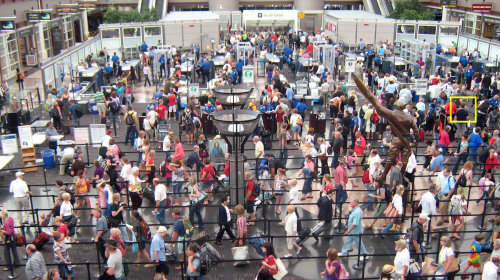
The └¤░─├┼┐¬Ż▒Żß╣ű is appearing today before the Third Circuit Court of Appeals to argue on behalf of our client, Nick George.
In August 2009, Nick went to the Philadelphia International Airport to catch a flight to California and begin his senior year at Pomona College. At the airport, he was detained, abusively interrogated, handcuffed, and jailed for several hours in a holding cell ÔÇô solely because he was carrying a set of Arabic-English flashcards for his language studies, and a critical of U.S. foreign policy.
ThatÔÇÖs right: no liquids, no matches, no weapons, no explosives. Just First Amendment-protected materials.
Nick, who was double majoring in physics and Middle Eastern studies and had been learning Arabic since his freshman year, arrived at the security checkpoint with a single piece of carry-on luggage, in which he had stereo speakers. As he approached the X-ray machine, a TSA officer asked him what he had in his bag, and Nick truthfully replied. The officer asked him to step aside for secondary screening, and Nick complied. His speakers were X-rayed separately, and his cell phone swabbed twice to test for explosives ÔÇô all with negative results. At this point, he should have been free to board his plane. He wasnÔÇÖt.
Please note that by playing this clip You Tube and Google will place a long-term cookie on your computer. Please see on their website and on theirs to learn more. To view the └¤░─├┼┐¬Ż▒Żß╣ű's privacy statement, click here.
WeÔÇÖre all familiar with searches at the airport. Courts have held that they are permissible under a narrow exception to the Fourth AmendmentÔÇÖs requirement that a government officer have at least a reasonable suspicion of criminal activity before she may detain an individual or search his belongings. That exception allows airport security officials to conduct suspicionless safety checks for the sole purpose of ensuring that a passenger is not carrying weapons or explosives.
These are well-established legal principles, and the TSA officers were constitutionally required to let Nick board his flight as soon as they had had determined that he carried neither weapons nor explosives. Instead, the TSA officers stalled because during the secondary screening, when Nick was asked to empty his pockets, he had produced his flashcards, which he was using to learn the vocabulary of contemporary Arabic-language media.
While one TSA agent asked Nick about a recent Phillies game, the other stepped away to call a supervisor and tell her about NickÔÇÖs flashcards. Thirty minutes later, the TSA supervisor arrived and began interrogating Nick in a hostile and aggressive manner.
Noticing NickÔÇÖs book, the TSA supervisor said: ÔÇťYou clearly read. Do you know who did 9/11?ÔÇŁ
Taken aback, Nick answered, ÔÇťOsama bin Laden.ÔÇŁ
The TSA supervisor asked ÔÇťDo you know what language he spoke?ÔÇŁ
Nick answered, ÔÇťArabic.ÔÇŁ
The TSA supervisor then held up the flashcards and said, ÔÇťDo you see why these cards are suspicious?ÔÇŁ
Then, a Philadelphia police officer ÔÇô whom the TSA had summoned ÔÇô handcuffed Nick and marched him through the terminal, in full view of other passengers, to the airport police station. Nick was told he was being taken for ÔÇťextra screeningÔÇŁ but was instead locked inside a jail cell. The police held him there for hours at the request of federal law enforcement officials. Eventually, two FBI agents arrived and interrogated Nick for an additional thirty minutes.
At the end of the interview, one of them said to Nick, ÔÇťThe police call us to evaluate whether there is a real threat. You are not a real threat.ÔÇŁ
Throughout the experience, Nick remained cooperative and calm. He was never advised of any rights or given an explanation for his mistreatment. His ordeal lasted for almost five hours, with four of those spent in the jail cell.
The only thing more outrageous than these facts is the position the government has taken in our lawsuit. From the beginning, the defendants have maintained that their egregious actions were somehow consistent with the Constitution. Last year, the federal district court disagreed; on appeal, the TSA officers and the FBI agents continue to insist that they did nothing wrong.
As one federal appeals court in 2005, ÔÇť[E]ven with the grave threat posed by airborne terrorist attacks, the vital and hallowed strictures of the Fourth Amendment still apply: searches must be reasonable to comport with the Constitution.ÔÇŁ
Every single federal court to have considered this issue has come to the same exact conclusion. The implication of the defendantsÔÇÖ position in our lawsuit is that Americans lose one of their most treasured and basic constitutional rights when they decide to fly. This is not, and has never been, the law.

